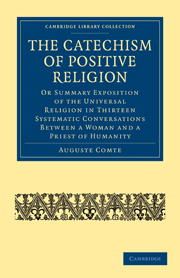 The Catechism of Positive Religion
The Catechism of Positive Religion Book contents
- Frontmatter
- PREFATORY NOTE TO THIRD EDITTON
- Contents
- PREFACE
- POSITIVIST LIBRARY
- HINT TO THE READER
- INTRODUCTION
- First Part EXPLANATION OF THE WORSHIP
- Second Part EXPLANATION OF THE DOCTRINE
- Third Part EXPLANATION OF THE REGIME, OR SYSTEM OF LIFE
- CONVERSATION IX The Regime as a whole
- CONVERSATION X Private Life
- CONVERSATION XI Public life
- CONCLUSION: GENERAL HISTORY OF RELIGION
- TABLES
CONVERSATION XI - Public life
Published online by Cambridge University Press: 05 October 2010
- Frontmatter
- PREFATORY NOTE TO THIRD EDITTON
- Contents
- PREFACE
- POSITIVIST LIBRARY
- HINT TO THE READER
- INTRODUCTION
- First Part EXPLANATION OF THE WORSHIP
- Second Part EXPLANATION OF THE DOCTRINE
- Third Part EXPLANATION OF THE REGIME, OR SYSTEM OF LIFE
- CONVERSATION IX The Regime as a whole
- CONVERSATION X Private Life
- CONVERSATION XI Public life
- CONCLUSION: GENERAL HISTORY OF RELIGION
- TABLES
Summary
The Woman.—On approaching the higher portion of Positive morals, I must, my father, ask for three preliminary explanations.
The first refers to the metaphysical objection often made to Positivism that it admits no kind of rights. If it is so, I am more inclined to congratulate you on it than to complain. For the interposition of right has almost invariably seemed meant to supersede reason or affection. It is fortunately not allowed women, and they are all the better for it. You know my favourite maxim: Our species more than the others needs duties to engender feelings.
The Priest.—It is true, my daughter, that Positivism recognises no other right for any one but the right always to do his duty. To speak more accurately, our religion imposes on all the obligation to help each one to discharge his proper function. The idea of right has to disappear from the political, as the idea of cause from the philosophical domain. For both notions refer to wills above discussion. Thus, all rights whatever imply of necessity a supernatural source, for no other can place them above human discussion. Whilst concentrated in the governors, they could have a real social efficacy, as the normal guarantees of an indispensable obedience, so long as the preparatory regime lasted, based on theology and war.
- Type
- Chapter
- Information
- The Catechism of Positive ReligionOr Summary Exposition of the Universal Religion in Thirteen Systematic Conversations between a Woman and a Priest of Humanity, pp. 229 - 254Publisher: Cambridge University PressPrint publication year: 2009First published in: 1891


